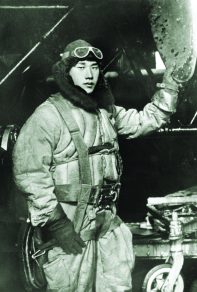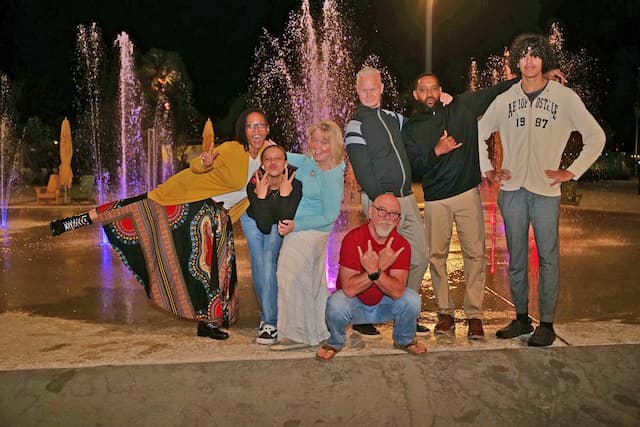Making an Honorary Citizen Out of an Enemy

September 9th is the 80th anniversary of a unique event in the annals of World War II. September 9, 1942 was the only time the contiguous United States was bombed by the enemy.

Nobuo Fujita was a Japanese naval pilot who proposed the idea of bombing the American mainland and doing so from seaplanes launched from submarine aircraft carriers. The aim was to get the US military to station some of the US fleet close to home and away from the major fighting in the Pacific Theater. The idea was approved and Fujita himself flew the plane.
The Japanese submarine surfaced off the Oregon/California coast, and Fujita took off in a plane carrying two incendiary bombs. He dropped both bombs in the area near Brookings, Oregon. Dropping incendiary bombs in an area thick with trees should have caused major fires, but it had rained the night before and the fires were quickly put out.
Fujita tried it again 20 days later, and although Fujita claimed he saw flames, no one in the US noticed anything. So much for the bombing of the US.
 Fujita, his seaplane, and the submarine went on to see other action in the Pacific, but the attempts to disrupt life in the US came to nothing.
Fujita, his seaplane, and the submarine went on to see other action in the Pacific, but the attempts to disrupt life in the US came to nothing.
It may have come to nothing, but after the war, Fujita was ashamed of his actions. He felt nothing but remorse until he received a surprising invitation. In 1962, the town of Brookings, Oregon—the very town he tried to set on fire—invited him to be their guest of honor at their Azalea Festival.
Fujita accepted the invitation, but he took his family’s 400-year-old samurai sword. Fujita’s plan was to use the family sword to commit seppuku—hara-kiri—and kill himself as an action of remorse in case the town’s intentions were hostile. But the city was not hostile. Although the town was divided, city leaders chose to make a public gesture of forgiving Fujita. Keep in mind that the town of Brookings made this goodwill gesture first. They didn’t want for his apology.
Nobuo Fujita embraced their forgiveness and sought to make amends for his bombing. Instead of using the sword to kill himself, Fajita gave the family sword to the city as a gesture of friendship. Over the years, he made repeated visits to the city. He planted a tree at the bomb site. He raised money for the town library. He made arrangements for local students to visit Japan. Fajita was truly sorry for his actions, but that was expressed in more than words.
Just a few days before his death, Nobuo Fujita was made an honorary citizen of Brookings, Oregon.
I love this story from two reasons.
It illustrates the beauty of forgiveness. Twenty years after the bombings, the town of Brookings reached out with a gesture of good will. The essence of forgiveness is the idea that “I’m not holding this against you.” Some people struggle with forgiveness because it feels like you’re saying it was no big deal what the other person did, or it was OK what the person did. No, forgiveness acknowledges a hurt or offense but chooses to move away from it. The town of Brookings sought to build a bridge to Fujita, and in the process, they gained a friend and a supporter. Both sides benefited. That is not the case in all situations. To forgive does not mean you need to return to the relationship as it once was because it some situations (like abuse) that could lead to further harm. But in so many situations, a positive reconciliation does occur.
Reaching out to Nobuo Fujita was an option for the town of Brookings, but for the Christian unforgiveness is not an option. Regardless of the other person’s heart, we are called to forgive and free ourselves from the burden of bitterness. We’ve been recipients of God’s grace which we didn’t deserve, so let’s be a conduit of God’s grace to others.
“Pursue peace with everyone, and holiness — without it no one will see the Lord. Make sure that no one falls short of the grace of God and that no root of bitterness springs up, causing trouble and defiling many” (Heb. 12:14-15).
It illustrates a repentant heart. In his remorse, Fujita sought to support the town, not destroy it. His actions showed his changed heart. He was no longer their enemy, and it was evident.
Too many people are sorry because they feel guilty; they’re not necessarily sorry for what they said or did. But repentance reflects a change of heart, not just a desire not to feel bad! Repentance is far more than a quick, “I’m sorry.” It is seen in our actions. As John the Baptist said, “Produce fruit consistent with repentance” (Matt. 3:8).
Both actions—forgiving and repenting—can be done regardless of the other person, but when both actions are involved, incredible things happen. Lives are changed. Relationships are restored. Peace ensues. We have no greater example than what happens when we repent before God. Jesus offers us forgiveness, and when we embrace His forgiveness and turn from our sin in repentance, the most incredible thing happens. New life. Eternal life with the One who loves us deeply and infinitely.
“For you, Lord, are kind and ready to forgive, abounding in faithful love to all who call on you” (Ps. 86:5).
Let’s do for others even as Christ has done for us.
“Just as the Lord has forgiven you, so you are also to forgive” (Col. 3:13).
Subscribe to this blog or like our Facebook page. And share this post with others.
If you would like a printable version of this, check out PrintFriendly.










